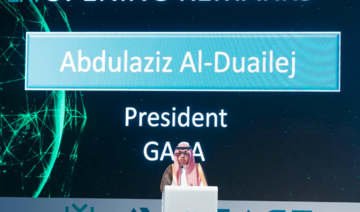Seasoned regional investor Yazan Abdeen has developed a simple formula for successful investing in the Arabian Gulf: “Buy when people cry. Sell when they yell.”
His maxim implies that investors should appreciate the buying opportunities in falling markets, as well as the chances of realizing a healthy profit in periods of market enthusiasm. It has served him well in a career of nearly two decades in the UAE and Saudi Arabia.
Abdeen is chief executive officer of Abu Dhabi Investment Management, managing a portfolio on behalf of InvestAD, one of the UAE’s big investment vehicles owned ultimately by the giant Mubadala. It is, he said, a specialist asset management firm that invests in Middle East and North Africa equities, with a basic strategy of maximizing return while managing risk.
That position gives him a good vantage point from which to survey financial business in the Gulf, and especially in Saudi Arabia, where he worked for several years with SEDCO, the Jeddah-based investment group, and in Riyadh, where he spent much of his youth.
Abdeen’s take on the current state of the Kingdom, as it gears up for the initial public offering of Saudi Aramco — the biggest event in its investment history — is illuminating. Some critics bemoan the relative lack of progress toward the Vision 2030 goals, but he believes analysts should distinguish between the long-term nature of the Vision strategy and the short-term changes that have already been accomplished.
“The National Transformation Program of 2015-16 has definitely created a shock effect in the economy. The previous standard of corporates living through government subsidy been completely changed.
BIO
BORN:
• 1981, Jordanian citizen
EDUCATION:
• American University of Beirut, BA applied science
• London Business School, MBAs in business administration and business, finance and economics
CAREER:
• Analyst, Capital Trust
• Investment manager, Damac Holding
• VP Asset management, Noor Holding
• Asset manager, Union Properties
• Fund manager, ING Investment Management
• Head of MENA Capital Markets, SEDCO
• Head of Capital Markets, Scope Investments
• CEO and Portfolio Manager, AD Investment Management
“The major changes were seen in the contracting sector, where the main contractors were living off government spending. They would simply put a 5 percent margin on top of the government cost of a project and live off that. This situation has changed drastically. It’s also been felt in the petrochemical sector where subsidies on feedstocks have been reduced or removed,” he said.
Consumers have also felt the effect. Petrol prices have risen, as have utilities bills, as government subventions have been stopped. “I could tell the difference in the electricity bills straightaway when I moved back to Saudi Arabia after some years in Dubai,” he said.
Growth rates in the non-oil sector have slowed as a result of the cuts in government subsidies, but Abdeen believes the short-term pain will be worth it. “It was a systemic shock, but a necessary one for Saudi Arabia to refine the operational viability of the private sector,” he said.
The policy of Saudization has also had a radical effect. “One third of the population was foreign labor, and this has also been changed, creating certain stress points in the economy. The securities that have been most affected are consumer discretionary ones, retail for example, but there are companies that have changed their business modes drastically and growth market share and today are running a profitability level significantly higher than they were in 2015.”
He highlighted the electronics retail group Extra as an example of a Saudi company nimble enough to take advantages of the changes.
Abdeen agreed that the privatization program — which was estimated at one point to bring $200 billion of assets to markets and attract foreign investment through public-private partnerships and other transactions — has been slow to get off the ground, but he pointed to the sale of shares in the bank NCB as an example of a successful Saudi IPO.
He said there was still a lot of pent-up interest in the assets being prepared for sale by the National Privatization Center, and that Tadawul had needed the time to make preparation for more share sales and achieve inclusion into the MSCI index, which has been done.
He sees big opportunities in the tech sector in Saudi Arabia, with its large youthful demographic and high Internet penetration, and also pointed to the big profits Saudi investors made on the $3.1 billion sale of Careem to Uber as positive factors in the Kingdom’s investment scene: “You could argue that Careem was a Saudi company, and it is also the largest market in the region for Careem’s business.”
In some ways, you might see the Saudi market changes and limited privatization steps so far as preparation for “the big one” — the forthcoming IPO of Saudi Aramco, confirmed to take place on Tadawul, perhaps as a prelude to a global offering, very soon. How does Abdeen view the Aramco IPO?
“I think that Aramco is going to change the platform not just for markets but also for us as asset managers in this part of the world. The weighting of Saudi Arabia in the global indices like MSCI and S&P is between 2 and 3 percent, but with the inclusion of Aramco you are talking about a significant increase, depending on the valuation,” he said.
Because Saudi markets comprise about 60 percent of the value of all regional markets, the Aramco IPO would significantly raise the profile of the Middle East in the emerging markets, he said.
“There is also the nature of Aramco itself. It is not only the most profitable company in the world, it is also the biggest single company producing crude oil. So it will have an impact both on emerging markets and on global markets,” he said.
“Whether you are a Middle East investor, or an emerging markets investor, or indeed a global investor, it is a subject you just cannot ignore. It is important for us as Middle East investors to be part of that offering,” he said.
“The rhetoric hasn’t changed since the beginning, that there will be a Tadawul listing of Aramco, and that is only natural. It needs to be offered locally, but with the Saudi market opening, it means that regional investors like us, and even global investors, will be able to invest in it in Saudi.
“After that, most of the exchanges in the world would like to have a company like Aramco listed on their exchange, but valuation and liquidity will be decisive factors in deciding where else in the world it will list. It needs to be in a global hub of capital, and the big ones around the world are well known — in New York, or London or Tokyo for that matter,” he added.
Although events in Saudi Arabia and at Aramco are taking center stage in most regional asset managers’ minds, Abdeen is still focused on the UAE, where a large proportion of his resources are committed.
He said that the biggest factors determining investor sentiment in the Emirates are commodity prices, interest rates, the real estate market and the health of the banking sector, all viewed against the backdrop of global financial, economic and geo-political pressures.
“The experts say there is a 100 percent probability that the Fed will cut rates in September, and there are two more possibilities to cut in the rest of the year,” he said. Meanwhile, he is conscious of the effect on regional investment prospects of the fallout from trade war between China and the US.
In the UAE, he believes there are challenges in the real estate, retail and some consumer sectors, but he still sees significant investment opportunities elsewhere — in the rapidly consolidating banking sector, as well as certain industrials and logistics equities.
In Dubai, he said that “hope is a stronger emotion that fear” as the emirate gears up for the Expo 2020 extravaganza next year. “The incremental capital spending to host the Expo make for good opportunities, and will drive the corporate sector. The millions of visitors who will come are going to create capital flows that will make for good opportunities. Maybe now is the time to bite the bullet on Dubai investment. It’s certainly not a time to be throwing in the towel.
“It all depends on your appetite for risk. For example, immediately after the global financial crisis you could buy Emaar shares for less than the price they eventually sold just their malls business for; equally, in Saudi Arabia in 2016 the big banks were just too cheap. The big test is, if I buy now and hold the stock for five years, whether I will still be happy,” he said.






















